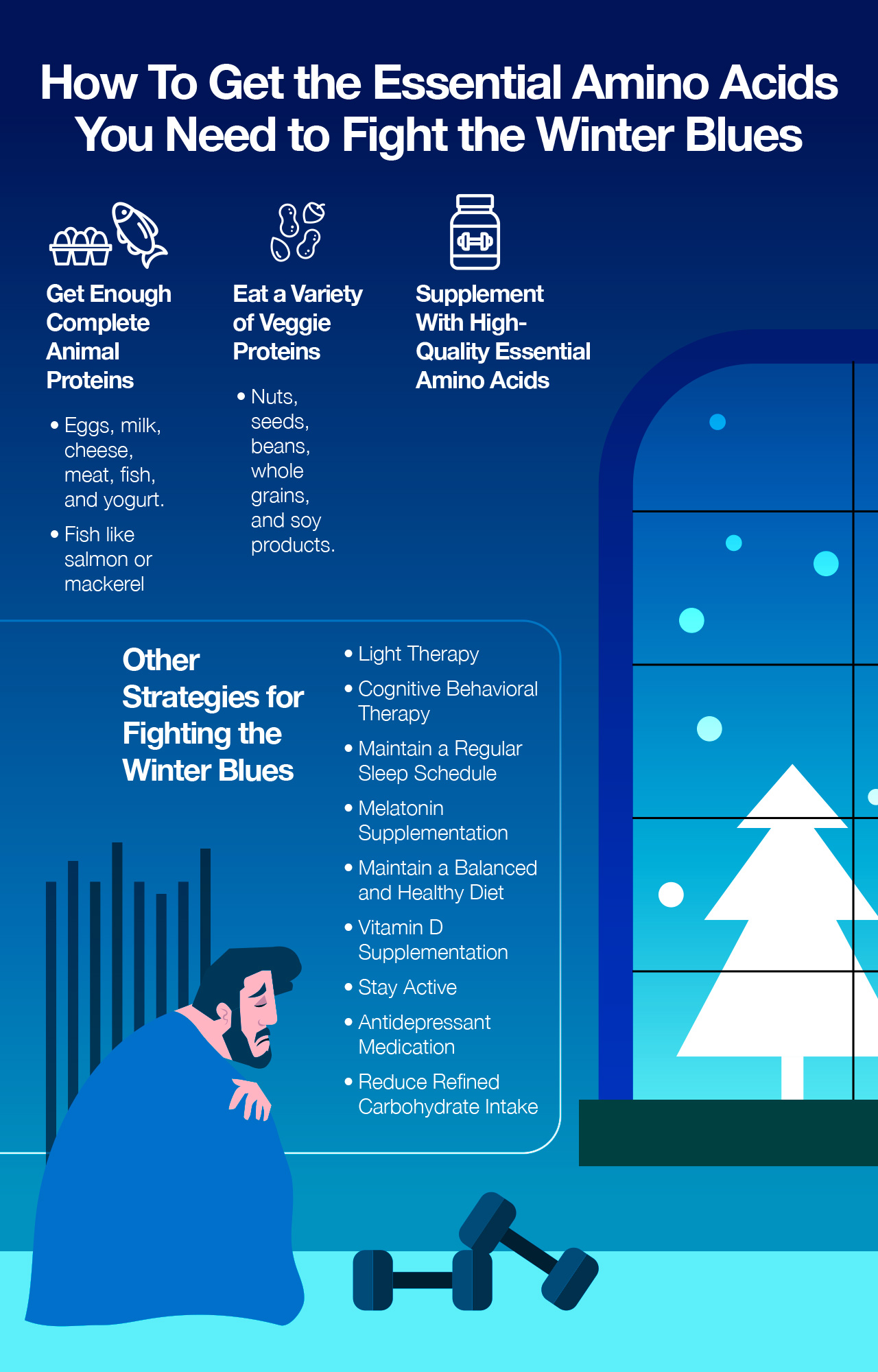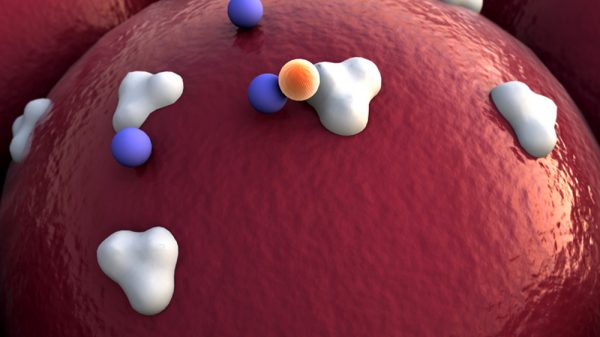Do you feel down during the winter months? The winter blues can be pretty common, due to the dwindling daylight hours throughout the late fall and winter seasons. A lack of sunlight can take a toll on our mental health and energy levels, causing seasonal affective disorder or seasonal depression (commonly known as the winter blues). The winter blues can seriously impact quality of life, leading to symptoms like low energy, poor sleep, appetite changes, and feelings of hopelessness.
Luckily, there are things you can do to manage seasonal depression. Essential amino acids can be an integral part of your regimen for managing the condition. Read on to find out more.
The Lowdown on Essential Amino Acids
Amino acids are the building blocks of protein, chemically combining to produce various protein structures. When we consume protein, the body breaks down whole protein particles into individual amino acids. These individual amino acids are then shuttled throughout the body to be used in a variety of biological processes such as muscle synthesis and the production of enzymes and neurotransmitters. Getting optimal ratios of essential amino acids in our diet is vital for supporting a healthy immune system, liver, body composition, and brain.
The Research on Essential Amino Acids and Winter Blues
Research published in Reviews in Neuroscience suggests that tryptophan may be helpful for combating seasonal affective disorder, especially when used in conjunction with light therapy. (1)
The essential amino acid tryptophan is a critical building block that the body uses to produce the neurotransmitter serotonin. Lower levels of serotonin are linked to depression and seasonal affective disorder, while higher levels of serotonin help boost mood and regulate appetite.
Beyond just tryptophan, research has also found fluctuations in other amino acid levels throughout the year. In a study published in Archives of General Psychiatry, researchers found significant changes in L-tryptophan as well as leucine, phenylalanine, and valine over the course of the year. (2) Higher tryptophan levels were observed in spring, in comparison to other seasons.
Taking optimal ratios of essential amino acids in supplement form may help balance out all essential amino acid levels, therefore supporting brain health and helping to combat the winter blues.
How Can You Get the Essential Amino Acids You Need to Fight the Winter Blues?
Essential amino acids must be obtained from our diets since the body is unable to synthesize these amino acids. How do you make sure that you’re getting enough essential amino acids to support your mental health? Here are a few strategies.
Getting Enough Complete Animal Proteins
Protein sourced from animals provides optimal ratios of essential amino acids that the human body needs to carry out all important functions. Examples of high-quality protein sources include eggs, milk, cheese, meat, fish, and yogurt. To protect your health, steer clear of fatty sources of meat and dairy. Stick to low-fat cuts of meat, nonfat dairy, and egg whites in order to benefit from the optimal ratios of essential amino acids that these proteins provide, without the harmful saturated fat. Keep in mind that fish contains a healthy source of fat called polyunsaturated fats, or omega-3 fatty acids. Fish like salmon or mackerel contain both optimal ratios of essential amino acids as well as anti-inflammatory fats.
Eating a Variety of Veggie Proteins
Unlike animal sources of protein, vegetable sources of protein contain unbalanced ratios of essential amino acids. Every source of plant protein is missing at least one of the essential amino acids. This missing amino acid is referred to as the limiting amino acid. When your body is missing one of the essential amino acids, all biological functions utilizing amino acids slow down.
In order to obtain optimal ratios of essential amino acids from a plant-based diet, it’s crucial to consume a variety of veggie proteins over the course of the day. Although each vegetable protein source is missing at least one of the essential amino acids, plant-based protein sources aren’t always missing the same amino acids. As a result, combining different sources of plant-based proteins helps complement the essential amino acid profiles, helping to ensure that you’re getting the essential amino acids that you need.
Great sources of plant-based protein include nuts, seeds, beans, whole grains, and soy products. For example, you could get optimal ratios of essential amino acids from a vegetable and tofu stir-fry served over brown rice. Even a peanut butter sandwich on whole-grain bread is a great source of protein and balanced ratios of essential amino acids.
Supplementing
It can be tough to ensure that you’re getting the optimal ratios of essential amino acids that the body needs to support all of the body’s processes. It’s also important to keep in mind that the body’s need for essential amino acids increases under periods of stress. As a result, there may be certain times of the year that you need to consume more essential amino acids in order to keep up with the body’s demand.
Sometimes, it is simply not possible to perfectly plan your diet to ensure that you’re getting all of the protein that you need. This becomes even more difficult when you’re following a strictly vegan diet. To make sure that you’re getting the optimal ratios of essential amino acids needed to combat the winter blues, it may be helpful to take a daily supplement to support your needs. Try incorporating a high-quality supplement into your diet on a regular basis.
One thing to keep in mind is to avoid taking individual essential amino acid supplements. All essential amino acids are equally important for keeping biological processes running smoothly, and taking just one can throw off the body’s careful balance. Look for a high-quality supplement that provides optimal ratios of all essential amino acids.
Other Strategies for Fighting the Winter Blues
In addition to essential amino acid supplementation, there are other steps you can take to boost your mood during the winter months.
1. Light Therapy
Light therapy or phototherapy can be a helpful component of your management plan for seasonal depression, especially in areas of the world where there are very few hours of sunlight during the winter.
You can purchase a light box to position in your living or working area, to increase your exposure to ultraviolet light. Light boxes are designed to replicate natural light from the sun. Our eyes and brains are programmed to react to exposure to outdoor light in a way that balances our circadian rhythm and enhances mood. Replacing the lost daylight with artificial light during winter months is an effective strategy for preventing and managing seasonal depression.
2. Cognitive Behavioral Therapy
Cognitive behavioral therapy – also known as CBT – is a form of talk therapy that is helpful for managing a variety of mental health issues. Regular appointments with a cognitive behavioral therapist can help you alter your thought patterns and behavioral habits, in order to manage depressive symptoms. Talk to your doctor about finding a therapist that can help you manage symptoms of depression through cognitive behavioral therapy.
3. Maintaining a Regular Sleep Schedule
When warding off the winter blues, it’s a good idea to maintain a regular sleep schedule. For example, aim to go to bed and wake up around the same time each day. You may find that it’s helpful to establish a bedtime routine, such as reading or meditating before bed. These activities can help the body and mind relax and prepare for sleep. Similarly, it can be helpful to establish a morning routine to help your body and mind prepare for the day ahead. Keeping these habits supports the body’s natural biological clock.
4. Melatonin
The body naturally produces the hormone melatonin in response to darkness, helping to induce sleepiness in the evening hours. Taking a melatonin supplement in the evening may help you sleep more soundly while also helping to regulate your circadian rhythm. Better sleep and a regular circadian rhythm can help boost your mood and keep the winter blues at bay.
5. Maintaining a Balanced Diet
Eating a balanced diet can help nourish your body and brain with the nutrients they need to function optimally. Enjoying foods from all food groups is a crucial part of managing seasonal depression. Fruits and veggies offer vitamins, minerals, and antioxidants that support immune system health and lower inflammation. Whole grains and beans are rich in fiber that improves gut health and cardiovascular health. Nuts, seeds, and fatty fish are high in healthy fats that support brain health and immune health. Proteins like lean meat and dairy offer amino acids that support nearly all biological functions, from muscle synthesis to neurotransmitter production.
6. Vitamin D Supplementation
Seasonal affective disorder may also be linked to vitamin D deficiency. Vitamin D is a critical fat-soluble vitamin that is present in very few foods. Humans synthesize the majority of their vitamin D from exposure to the sun. Having sufficient levels of vitamin D is important for healthy bones, immune system function, and brain health.
During winter months, we naturally get less sunlight, and produce lower levels of vitamin D. People living at more Northern latitudes are at a higher risk of experiencing vitamin D deficiency and a higher risk of experiencing winter depression. Contrastingly, people living closer to the equator – in areas like Florida that offer lots of sunlight – tend to have a lower risk of seasonal affective disorder.
Vitamin D is involved in so many biological processes, and most people in the United States have insufficient or deficient levels of the vitamin. Incorporating a vitamin D supplement into your routine could increase your vitamin D levels and help protect your mental health.
7. Staying Active
Staying physically active is often recommended for individuals struggling with any form of depression. A study published in Frontiers in Psychology investigated the impact of exercise on 129 individuals with mental health disorders. (3) Results revealed that exercise was linked to improvements in measures of attention, mood, and tiredness. (3) This may have implications for managing the winter blues, and incorporating regular physical activity into your daily routine is an important strategy for managing seasonal depression.
Keep in mind that you don’t need to do an intense, 2-hour workout to experience the mood-boosting benefits of exercise. Try engaging in 20-30 minutes of cardio each day, through activities like walking, biking, hiking, jogging, or dancing.
8. Medication
A psychiatrist will be able to evaluate your symptoms and decide if medication would fit your needs. Antidepressant medication is a very effective treatment option in the management of seasonal depression.
A class of antidepressants called selective serotonin reuptake inhibitors (SSRIs) are often used for treating depression, including seasonal affective disorder. SSRIs work by increasing the brain chemical serotonin, which helps to improve mood. Keep in mind that antidepressants or any medication may come with side effects.
9. Reducing Refined Carbohydrate Intake
Eating too many refined carbohydrates can contribute to fluctuating energy levels and mood. When we consume refined carbohydrates, they are quickly broken down into glucose molecules, which enter the bloodstream and cause a spike in blood sugar levels. After a short period of time, blood sugar levels plummet. Our energy levels fluctuate alongside these changing blood sugar levels.
When our blood sugars are high, we experience a rush of energy. When blood sugar levels are low, we feel low energy and sluggish. Consuming too many refined carbohydrates can worsen symptoms of seasonal depression and exacerbate mood changes. To reduce your intake of refined carbohydrates, steer clear of foods like white bread, white pasta, white rice, and foods prepared with white flour.
Instead, reach for whole grains that provide a steady release of energy, without spiking blood sugar levels. Great examples include whole-grain pasta, brown rice, quinoa, sweet potatoes, and oats.
10. Healthy Diet
In addition to getting optimal ratios of essential amino acids and choosing complex carbohydrates over refined carbs, it’s also helpful to eat a generally balanced diet that offers all the nutrients that the body needs to function optimally.
A healthy diet is made up of a variety of foods that supply the nutrients necessary for the body to carry out all functions and support brain health. Here are a few more important guidelines for following a healthy, balanced diet:
- Healthy fats: Healthy fats like polyunsaturated fats and monounsaturated fats support brain health and help lower inflammation. Sources of healthy fats include nuts, seeds, avocado, olive oil, and fatty fish like salmon.
- Micronutrients: Micronutrients are compounds that help biological processes proceed, without providing calories. Examples of important micronutrients include vitamins, minerals, and antioxidants. You can obtain a balance of micronutrients from foods like fruits, veggies, whole grains, nuts, seeds, beans, and lean proteins.
- Whole foods: Choose primarily foods that are unprocessed or minimally processed. These foods offer the most macronutrients and micronutrients, without harmful additives. Steer clear of packaged and pre-made foods.
Things to Keep in Mind
If you or a loved one are exhibiting symptoms of SAD such as weight gain, appetite changes, loss of interest in previously enjoyed activities, and changes in sleep patterns around winter months, you may be experiencing seasonal depression. If you are experiencing symptoms, it’s important to seek medical attention from a health professional.
It’s also important to keep in mind that you may be at a higher risk of experiencing seasonal affective disorder if you have a type of depression such as major depression, or other mood disorder.
Conclusion: Why Essential Amino Acids Can Help the Winter Blues
Seasonal depression is common in the winter months, when there are shorter days and fewer hours of sunlight. Essential amino acids are critical nutrients that support liver health, metabolic health, and brain health. Research shows that seasonal depression may be linked to an imbalance in essential amino acids levels. In particular, low levels of tryptophan may affect levels of serotonin, the neurotransmitter responsible for regulating mood. Taking a carefully balanced blend of essential amino acids may help support healthy levels of neurotransmitters. You can obtain essential amino acids from animal proteins, complementary plant proteins, or a high-quality essential amino acid supplement. In combination with other management strategies like light therapy, medications, and physical activity, essential amino acids can help beat the winter blues.

References:
(1) https://pubmed.ncbi.nlm.nih.gov/26167977/
(2) https://pubmed.ncbi.nlm.nih.gov/7487342/
(3) https://www.frontiersin.org/articles/10.3389/fpsyg.2018.00249/full























